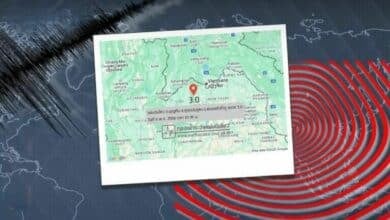Cyclone Mocha brings storm surge to western Myanmar and southeastern Bangladesh

Cyclone Mocha swept through Myanmar and southeastern Bangladesh yesterday, causing storm surges in western Myanmar, despite sparing large refugee camps. The cyclone made landfall between Bangladesh’s Cox’s Bazar and Sittwe in Myanmar, with winds reaching up to 195kph in the most significant storm to hit the Bay of Bengal in over ten years. Although communications with Sittwe were mostly cut off, no severe damage was reported.
In Bangladesh’s Cox’s Bazar, around 400 to 500 makeshift shelters were damaged within camps housing almost one million Rohingya refugees. However, no casualties were reported, according to refugee commissioner Mizanur Rahman.
Kamrul Hasan, a disaster official, reported that there was no significant damage in Bangladesh. Authorities had evacuated 750,000 people in anticipation of the storm. In Myanmar’s Rakhine state, the cyclone destroyed homes made of tarpaulin and bamboo in one camp for displaced Rohingya at Kyaukphyu. Many residents left Sittwe on Saturday for higher ground inland to avoid the storm surge, which was expected to reach up to 3.5 meters.
The Myanmar Red Cross Society is now preparing for a significant emergency response in the region. Meanwhile, authorities in Bangladesh have prohibited Rohingya refugees from building concrete homes, citing concerns that it may encourage them to settle permanently instead of returning to Myanmar, from which they fled five years ago following a brutal military crackdown.
The cyclone is predicted to bring heavy rain, increasing the risk of landslides in the hillsides where refugee camps are located. Thousands of people also fled Saint Martin’s island in Bangladesh, a local resort area directly in the storm’s path. But fortunately, there were no reported casualties from fallen trees, only two injuries.
Cyclone Mocha is the most potent storm to hit Bangladesh since Cyclone Sidr in 2007, which killed over 3,000 people and caused billions of US$ in damage, according to Azizur Rahman, the head of Bangladesh’s Meteorological Department. In recent years, improved forecasting and effective evacuation planning have drastically reduced cyclone-related death tolls reports Channel News Asia.
Operations were halted at Bangladesh’s largest seaport, Chittagong, and boat transport and fishing were also suspended. Cyclones typically threaten the coast of the northern Indian Ocean, where tens of millions of people reside. Cyclone Nargis devastated Myanmar’s Irrawaddy Delta in 2008, killing at least 138,000 people. Scientists have warned that storms are growing more intense as climate change warms the world.
Latest Thailand News
Follow The Thaiger on Google News:
































